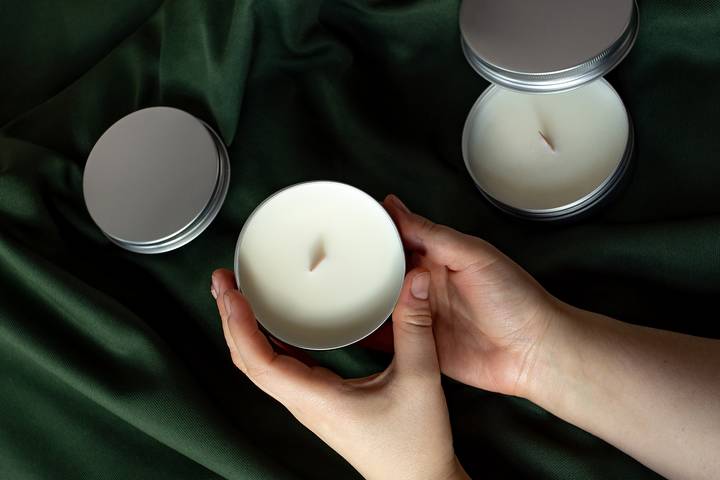Imagine this: you sink your head lower into your bubble bath, letting the warm water surround you. Your bathtub caddy sits perched on the edge of the tub, holding your wine, magazine, and crackers. One thing missing from making this the perfect night: a candle. You ask your partner to light a candle, and they light a candle you’ve never seen before: a coconut wax candle.
Coconut wax candles have increased in popularity over the years; however, before you purchase one, you need to explore whether it is the right candle for you. Coconut wax is a colourless and odourless wax produced by processing coconut meat or coconut oil. It is often blended with other natural waxes to produce a desired texture or aroma. Its competitors include paraffin wax, soy wax, and beeswax: options that we will compare and contrast against coconut wax.
Here are the nine pros and cons of coconut wax candles:
Pro: Cleaner burn

Paraffin wax, the traditional wax used to make candles, has been proven to release chemicals associated with cancer. Because of the dangers associated with fumes, a candle that burns clean is ideal.
A coconut wax candle is an example of a clean burning candle. It is non-toxic and releases non-damaging fumes when burned. It also produces no soot and smoke, meaning the surfaces around your home will be kept clean.
Pro: Slow and even burn

Coconut wax is among the slowest waxes to burn. It has been tested to have a 60% higher burn time than paraffin wax. Because it burns slowly, the candle is a better investment as it lasts longer for the same volume of wax.
Its even burn ensures that you are getting the most bang out for your buck by burning the candle in its entirety instead of leaving wax stuck to the sides.
Pro: Excellent at throwing scent

A coconut wax candle’s ability to throw scent well means that it can easily fill up a room with the desired scent for long periods.
Not only is it able to throw scent well when burned, but it also has the same abilities even at rest: when you open a coconut wax candle to smell, its rich aroma will fill the air almost as if it was lit.
Pro: Versatility

Because coconut wax is easily manipulated, these candles can come in various colours, scents, and shapes. It can be mixed with fragrances for a strong scent throw if desired or blended with bright or muted colours.
Unlike soy wax, coconut wax has a smooth surface, and its dyes will not fade, ensuring the candle of your dreams.
Pro: Sustainability

Coconut wax is more sustainable than soy, paraffin, and palm wax. Coconut wax is produced through an all-natural process called hydrogenation. Hydrogenation transforms coconut oil into wax, which is then cleaned, filtered, and transformed into an all-natural, completely biodegradable wax.
Greater than the process, though, coconut is a renewable and high-yield crop, meaning that fewer coconuts are needed to produce a sizable amount of wax! Thus, this type of wax is one of the most eco-friendly and sustainable products on the candle market.
The negatives of coconut wax candles include:
Con: Its high price point

Due to its sustainable foundation and lack of mass production, coconut wax candles are significantly more expensive than paraffin, soy, and beeswax candles. Because paraffin wax is a byproduct of crude oil (which is more easily accessible and therefore less expensive), most of the candles on the market are made of paraffin wax.
Although coconut wax is traditionally more expensive, depending on the supplier you choose and the quantity you are purchasing, prices will fluctuate. Remember: you will always get a better discount when buying in bulk.
Con: Low melting point

These candles have relatively low melting points, which could potentially be problematic when shipping and storing in warmer areas. Because they do not do well with extreme heat (other than when it is purposefully burned, of course), you must be diligent in keeping them in cool, dry areas.
Some coconut wax candle companies refuse to ship during peak summer months for this reason. On the other hand, this trait could potentially be a pro if you are the one making the candle, as its low melting point is easier to work with.
Con: Difficult to find pure

Due to its high prices and low melting point, it is difficult to find 100% pure coconut wax candles. Most candles branded as “coconut wax” are blended with a mixture of other waxes, including soy, palm, and paraffin.
If you are looking for a candle made purely from coconut, ensure that the label indicates “100%” coconut wax and examine the ingredient list for other types of wax.
Con: Source concerns

Usually, coconut wax is harvested sustainably. It is both vegan and cruelty-free. However, in some countries, coconuts are harvested through questionable means, including low wages and child labour. Avoid coconut products from Thailand and do your research.

